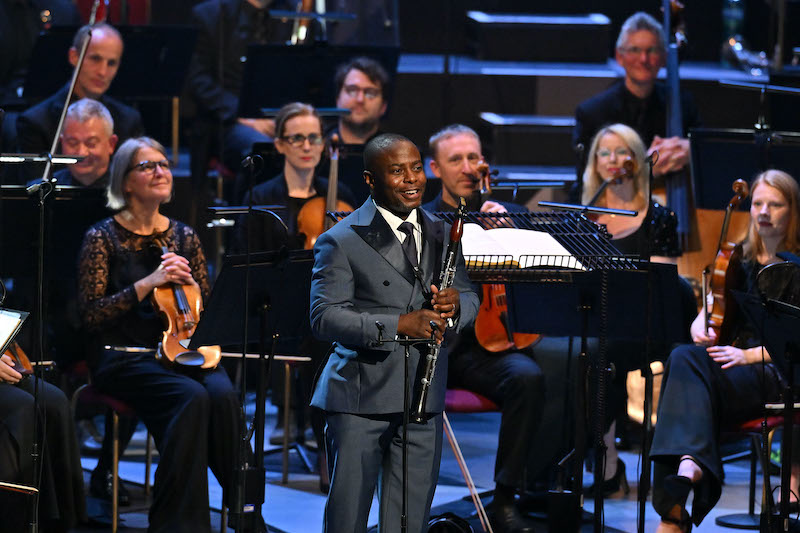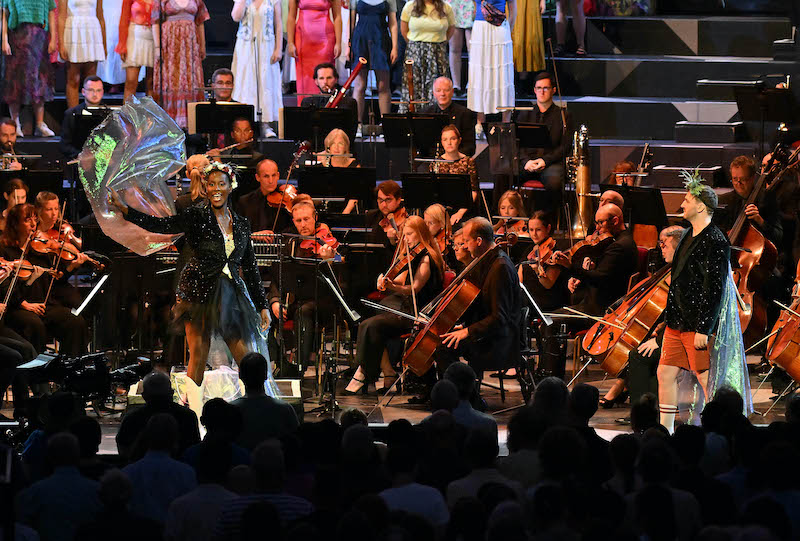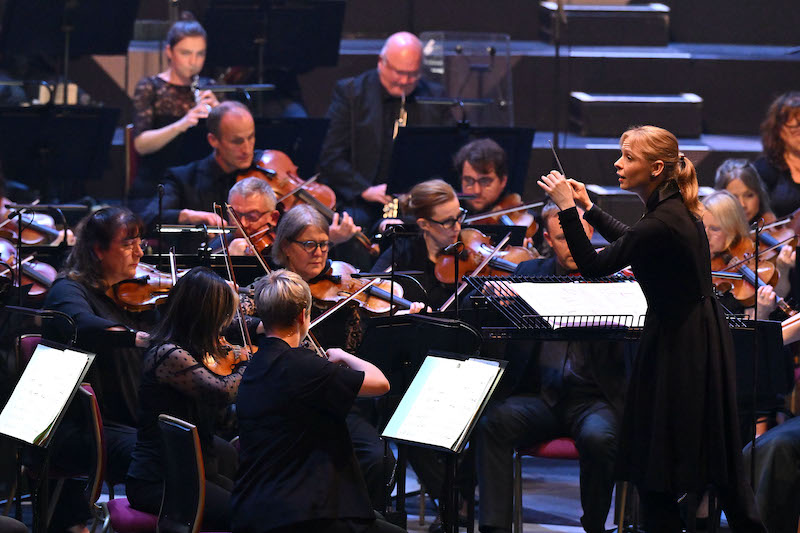Prom 36, McGill, BBCSSO, New review - summery Shakespearean mummery | reviews, news & interviews
Prom 36, McGill, BBCSSO, New review - summery Shakespearean mummery
Prom 36, McGill, BBCSSO, New review - summery Shakespearean mummery
Intimate Mozart concerto followed by theatrical, colourful Mendelssohn

My three Proms so far this year have all featured regional BBC orchestras conducted by women, all excellent, and it surely reflects well on the Proms management that they have done so much to address this gender imbalance in recent years. In last night’s Prom 36 the BBC Scottish Symphony Orchestra were led by the New Zealander Gemma New, who navigated a programme of Mozart, Mendelssohn and Bonis with élan, good humour and a gorgeous black frock coat.
Before doing my research, the name Mel Bonis would have suggested an Australian Olympic athlete, or Californian surf champion, but she was in fact a late 19th century French composer, who used “Mel” as opposed to “Mélanie” to disguise her femaleness. Her Salomé, a short orchestral portrait expanded from a solo piano original, was mercurial, in places sensuous, in others dramatic and urgent. It made for an enjoyable opener, but didn’t especially leave me desperate to investigate any more of her large oeuvre. Mozart’s Clarinet Concerto was more familiar terrain, played here by Anthony McGill (pictured above by Mark Allan), currently Principal Clarinet with the New York Philharmonic. The outer movements were taken fast, bordering on too fast: there were moments when his runs got to their end a bit ahead of themselves. But it was exciting, and McGill’s legato was as rich and smooth as the chocolate river in Willy Wonka’s factory. I had feared it was not an ideal Albert Hall choice, but McGill, unafraid to explore very quiet dynamics, took the orchestra and the audience with him when he did, and these were the most engrossing moments. The gorgeous second movement was played humbly, intimately and, for me, very movingly.
Mozart’s Clarinet Concerto was more familiar terrain, played here by Anthony McGill (pictured above by Mark Allan), currently Principal Clarinet with the New York Philharmonic. The outer movements were taken fast, bordering on too fast: there were moments when his runs got to their end a bit ahead of themselves. But it was exciting, and McGill’s legato was as rich and smooth as the chocolate river in Willy Wonka’s factory. I had feared it was not an ideal Albert Hall choice, but McGill, unafraid to explore very quiet dynamics, took the orchestra and the audience with him when he did, and these were the most engrossing moments. The gorgeous second movement was played humbly, intimately and, for me, very movingly. The orchestra, model accompanists in the Mozart, were able to come to the fore in Mendelssohn’s incidental music to A Midsummer Night’s Dream. Here they were joined by the upper voices of the National Youth Choir of Scotland and a pair of actors (Moyo Akandé and Ewan Black, pictured above), who garlanded the music with extracts from the Shakespeare. There was costume and a semi-staging, focusing on the magical element of the play, specifically the characters of Oberon and Titania. The choir had only two items to sing – and the lullaby “You spotted snakes with double tongue” was probably the highlight of the night – but they were an acting ensemble throughout, from their entry in shorts and summer dresses, to their donning of donkey ears, to the triumphant celebration of the “Wedding March”.
The orchestra, model accompanists in the Mozart, were able to come to the fore in Mendelssohn’s incidental music to A Midsummer Night’s Dream. Here they were joined by the upper voices of the National Youth Choir of Scotland and a pair of actors (Moyo Akandé and Ewan Black, pictured above), who garlanded the music with extracts from the Shakespeare. There was costume and a semi-staging, focusing on the magical element of the play, specifically the characters of Oberon and Titania. The choir had only two items to sing – and the lullaby “You spotted snakes with double tongue” was probably the highlight of the night – but they were an acting ensemble throughout, from their entry in shorts and summer dresses, to their donning of donkey ears, to the triumphant celebration of the “Wedding March”.
The actors, popping up in different costumes and in different parts of the hall, were good in their declamation, Moyo Akandé a very commanding presence as the Queen of the Fairies. Their dialogue dovetailed nicely with the Mendelssohn underscore where that was necessary, but stage director Victoria Newlyn mostly kept them out of the way. There were times I’d rather have just listened to the music, but the Proms is a time to try something a bit more ambitious than the run-of-the-mill, so there’s no criticism from me on that count. But of the music, the Overture was brilliant, written – almost unbelievably – when the composer was 17. The scoring is so innovative, from skittering fairy strings to warm wind chorales and the ever-present, fruity, tuba (Andrew Duncan). Gemma New (pictured above) shaped all the music with her expressive hands, gestures always going upwards as the music floated up into the hall. Sopranos Emily Kemp and Beth Stirling were light and frothy in the lullaby, Lauren Reeve-Rawlings supplied a lovely horn solo in the “Nocturne”, and the trumpets enjoyed the “Wedding March”, as they should. It was all very magical.
But of the music, the Overture was brilliant, written – almost unbelievably – when the composer was 17. The scoring is so innovative, from skittering fairy strings to warm wind chorales and the ever-present, fruity, tuba (Andrew Duncan). Gemma New (pictured above) shaped all the music with her expressive hands, gestures always going upwards as the music floated up into the hall. Sopranos Emily Kemp and Beth Stirling were light and frothy in the lullaby, Lauren Reeve-Rawlings supplied a lovely horn solo in the “Nocturne”, and the trumpets enjoyed the “Wedding March”, as they should. It was all very magical.
rating
Share this article
The future of Arts Journalism
You can stop theartsdesk.com closing!
We urgently need financing to survive. Our fundraising drive has thus far raised £49,000 but we need to reach £100,000 or we will be forced to close. Please contribute here: https://gofund.me/c3f6033d
And if you can forward this information to anyone who might assist, we’d be grateful.

Subscribe to theartsdesk.com
Thank you for continuing to read our work on theartsdesk.com. For unlimited access to every article in its entirety, including our archive of more than 15,000 pieces, we're asking for £5 per month or £40 per year. We feel it's a very good deal, and hope you do too.
To take a subscription now simply click here.
And if you're looking for that extra gift for a friend or family member, why not treat them to a theartsdesk.com gift subscription?
more Classical music
 theartsdesk at the Pärnu Music Festival 2025 - Arvo Pärt at 90 flanked by lightness and warmth
Paavo Järvi’s Estonian Festival Orchestra still casts its familiar spell
theartsdesk at the Pärnu Music Festival 2025 - Arvo Pärt at 90 flanked by lightness and warmth
Paavo Järvi’s Estonian Festival Orchestra still casts its familiar spell
 BBC Proms: Batsashvili, BBC Scottish Symphony Orchestra, Ryan Wigglesworth review - grief and glory
Subdued Mozart yields to blazing Bruckner
BBC Proms: Batsashvili, BBC Scottish Symphony Orchestra, Ryan Wigglesworth review - grief and glory
Subdued Mozart yields to blazing Bruckner
 Classical CDs: Hens, Hamburg and handmaids
An unsung French conductor boxed up, plus Argentinian string quartets and baroque keyboard music
Classical CDs: Hens, Hamburg and handmaids
An unsung French conductor boxed up, plus Argentinian string quartets and baroque keyboard music
 BBC Proms: McCarthy, Bournemouth SO, Wigglesworth review - spring-heeled variety
A Ravel concerto and a Walton symphony with depth but huge entertainment value
BBC Proms: McCarthy, Bournemouth SO, Wigglesworth review - spring-heeled variety
A Ravel concerto and a Walton symphony with depth but huge entertainment value
 BBC Proms: First Night, Batiashvili, BBCSO, Oramo review - glorious Vaughan Williams
Spirited festival opener is crowned with little-heard choral epic
BBC Proms: First Night, Batiashvili, BBCSO, Oramo review - glorious Vaughan Williams
Spirited festival opener is crowned with little-heard choral epic
 Interview: Quinteto Astor Piazzolla on playing in London and why Mick Jagger's a fan
Music Director Julián Vat and pianist Matias Feigin compare notes on Piazzolla
Interview: Quinteto Astor Piazzolla on playing in London and why Mick Jagger's a fan
Music Director Julián Vat and pianist Matias Feigin compare notes on Piazzolla
 Classical CDs: Bells, birdsong and braggadocio
British contemporary music, percussive piano concertos and a talented baritone sings Mozart
Classical CDs: Bells, birdsong and braggadocio
British contemporary music, percussive piano concertos and a talented baritone sings Mozart
 Siglo de Oro, Wigmore Hall review - electronic Lamentations and Trojan tragedy
Committed and intense performance of a newly-commissioned oratorio
Siglo de Oro, Wigmore Hall review - electronic Lamentations and Trojan tragedy
Committed and intense performance of a newly-commissioned oratorio
 Alfred Brendel 1931-2025 - a personal tribute
A master of feeling and intellect
Alfred Brendel 1931-2025 - a personal tribute
A master of feeling and intellect
 Aldeburgh Festival, Weekend 2 review - nine premieres, three young ensembles - and Allan Clayton
A solstice sunrise swim crowned the best of times at this phoenix of a festival
Aldeburgh Festival, Weekend 2 review - nine premieres, three young ensembles - and Allan Clayton
A solstice sunrise swim crowned the best of times at this phoenix of a festival

Add comment